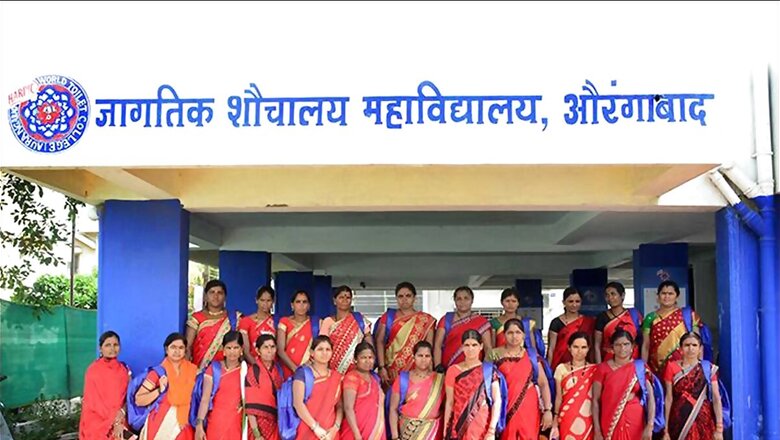
views
If you’ve ever been on a road trip, a train station, a stadium, or just about any public place, you’ve benefited from the work that sanitation workers do. Especially since the Swachh Bharat Mission commenced, we’ve seen a marked difference in both toilet access and toilet hygiene. We credit the Swachh Bharat Mission for it, but we often forget that the key players in this achievement: the sanitation workers.
Sanitation workers don’t get the credit they are due, and still face enormous social stigma in our society. Harpic, as India’s leading brand in the lavatory care segment, has a deep and nuanced understanding of the specific challenges that these women sanitation workers face, and it decided to put this understanding to good use, when it established the Harpic World Toilet College (HWTC) in 2016.
Harpic World Toilet College: Setting New Standards
HWTC was established with the stated objective of improving the quality of life of sanitation workers through their rehabilitation by linking them with dignified livelihood options. Workers trained by the college are provided placement with various organisations. Following the successful proof of concept in Rishikesh, HWTCs have opened in Maharashtra, Aurangabad, in partnership with Harpic, Jagran Pehel and Maharashtra Government.
There are specific ways in which HWTC uplifts and empowers women sanitation workers.
Holistic Training Approach
HWTC’s training programs are designed to be holistic, addressing not only technical skills but also personal development, health, and safety. Participants also learn about environmental cleanliness, water-related issues, and different sanitation practices.
Improved Health and Safety
Through training, women sanitation workers have gained awareness of health hazards and the importance of safety gear. The college emphasises the importance of safety gear and health precautions to protect workers from infections and hazards they may encounter during their work.
Economic Independence
The increase in income and the availability of benefits like Provident Fund and Employee State Insurance have provided economic stability to these women and their families. They are no longer solely dependent on irregular daily wages but have access to financial security.
Skill Enhancement and Career Advancement
HWTC equips participants with skills that extend beyond sanitation work. From digital literacy to other soft skills, these programs enable women to explore new career paths and diversify their income streams. More income streams = better financial security = a better future for themselves and their families.
Social Recognition
HWTC’s initiatives lead to social recognition and respect for women sanitation workers. As they excel in their new roles and become self-reliant, their communities appreciate their contributions more. Moreover, the training and certification provided uplifts the profession from ‘unskilled’ to ‘skilled’. This shift in perception is instrumental in breaking down societal barriers.
Empowering Mindsets, Creating Community Leaders
HWTC offers motivational support, enabling women sanitation workers to overcome societal stigmas and gain confidence in their abilities. These sessions equip them with the courage to express themselves, both within their communities and families. They offer a chance to learn from one another, and from other women who have already been on the journey, and now stand as shining examples of what’s possible. As a result, they emerge as leaders, advocating for proper training and recognition for all sanitation workers.
Stories of Transformation
At HWTC, the before and after transformation is a stark one. The sanitation workers come from poor, marginalised backgrounds, often work in the unorganised sector, and have very low self-esteem resulting from constant exclusion and dismissal. Then they receive training, and placement in the organised sector. Now, they have jobs that pay them well, have employee benefits, decent working hours, and access to protective gear. The psychological impact is massive. Possibly, for the first time in their lives, these people feel a sense of pride in the work that they do.
So while this kind of transformation is almost the norm at HWTC, there are some shining examples that really stand out.
Maya Sable: A Beacon of Hope
After 12 years of working in deplorable conditions in the unorganised sector, she found herself as the sole provider for her three daughters. Maya’s journey took a positive turn when she completed her training at HWTC. Placed at a Clean and Care Facilities Service in Housekeeping, she now earns more than double her previous salary and enjoys benefits like PPE kits, Provident Fund, ESI, and insurance. Her education improved her financial situation, and empowered her to raise awareness among and advocate for proper training for all sanitation workers.
Chhaya Warekar: Working for a Better Future
When her husband lost his job due to alcohol addiction, Chhaya sought training at HWTC. She was placed as a housekeeper at Dhoot Hospital, Aurangabad, where her salary now includes benefits like PF and ESIC. Chhaya works hard to provide her children with the best education possible, hoping that they will one day become government officers. Her education has allowed her to escape the hardships of unsafe sanitation work and pursue a brighter future for her family.
Tara Devanand Koli: Rising Above Comfort Zones
Tara Devanand Koli, a toilet cleaner, was known for taking on tasks that others refused to do. After enrolling in HWTC’s training program, Tara’s newfound confidence allowed her to seek better opportunities and secure a job at Hedgewar Hospital, Aurangabad. In the midst of a pandemic, she even volunteered to clean COVID-19 wards, demonstrating her dedication and commitment to public health. Her education broadened her horizons and encouraged her to step out of her comfort zone.
These stories are just the tip of the iceberg – there are hundreds more.
Training and certification is just one part of the larger solution to creating safe, judgement, stigma and ostracisation free spaces for sanitation workers. There is a need for greater dialogue and for creating awareness; and that’s where Mission Swachhta aur Paani comes in.
Three years ago, Harpic joined hands with News18 to create Mission Swachhta aur Paani, a movement that champions the cause of inclusive sanitation, equality for all genders, abilities, castes and classes and the strong belief that clean toilets are a shared responsibility.
Mission Swachhta aur Paani creates the space for dialogue on key issues regarding toilet access and toilet hygiene, and the problems that sanitation workers face. These discussions involve government officials, NGOs, activists, sanitation workers, educators and members of the public. The aim is to come up with informed solutions to nuanced problems, and raise the awareness of the general public about the problems we contribute to, and how we can reverse that trend.
Join us here, to learn about how you can be a part of the solution.















Comments
0 comment